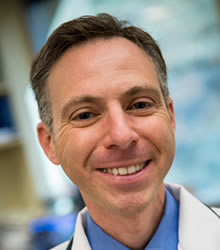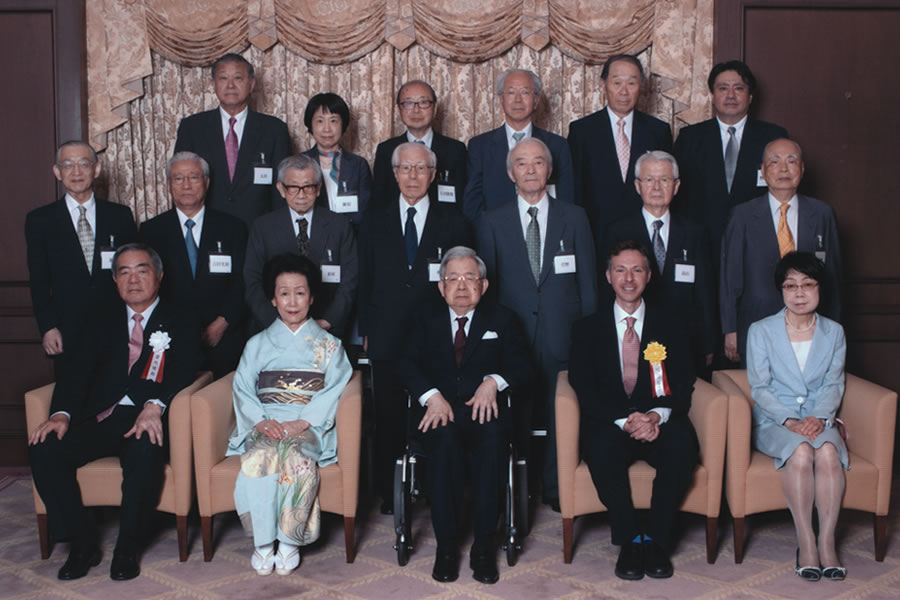The Awardee of the 2016 Prince Hitachi Prize for Comparative Oncology
"Mechanism of Cancer Resistance in Elephants"
 Joshua D. Schiffman
Joshua D. SchiffmanUniversity of Utah School of Medicine
Edward B. Clark, MD Chair in Pediatric Research
Medical Director, High Risk Pediatric Cancer Clinic
Professor of Pediatrics (Hematology/Oncology)
Personal History Outline
Dr. Schiffman was born in New Haven, Connecticut in the USA on 5 December 1973. When he was 8 years old, his family moved to Providence, Rhode Island. Dr. Schiffman’s father is a medical oncologist and diagnosed Dr. Schiffman with Hodgkin Lymphoma (a type of childhood cancer) when he was 15 years old. This experience influenced Dr. Schiffman’s decision to become a doctor and to care for children with cancer. After high school, Dr. Schiffman attended the 8-year combined undergraduate and medical school Program in Liberal Medical Education (PLME) at Brown University in Providence, Rhode Island. Dr. Schiffman studied psychology and animal behavior as an undergraduate at Brown University, and graduated with a Bachelor of Science in 1996. While an undergraduate, Dr. Schiffman was introduced to the concept of evolution and its influence on both animal and human development. During medical school, Dr. Schiffman became very interested in evolutionary (Darwinian) medicine and why human disease exists from an evolutionary perspective. Dr. Schiffman graduated with a Medical Degree from the Brown University School of Medicine in 2000.
Dr Schiffman continued medical training as a Resident in General Pediatrics at the Lucile Packard Children’s Hospital at Stanford University from 2000 to 2003, and was selected to be Chief Resident in Pediatrics from 2003 to 2004. Dr. Schiffman next completed Fellowship training in Pediatric Hematology-Oncology also at Stanford University from 2004-2007. While at Stanford, he began their Pediatric Cancer Genetics Program for children with inherited cancer syndromes. During his cancer training at Stanford, Dr. Schiffman worked in the cancer genetics laboratory of Dr. James Ford where he performed experiments on the genetics and genomics of cancer. Dr. Schiffman worked for an additional year in Dr. Ford’s laboratory from 2007-2008 and focused on how to translate genomic cancer discoveries to his patients with childhood cancer.
Dr. Schiffman has been on the faculty at the University of Utah in Salt Lake City, Utah since 2008, where he is a Professor in the Department of Pediatrics and an Adjunct Professor in the Department of Oncological Sciences. Dr. Schiffman holds the inaugural Edward B. Clark, MD Endowed Chair in Pediatric Research. Dr. Schiffman practices as a pediatric hematologist-oncologist at Intermountain’s Primary Children's Hospital (PCH) and directs a research laboratory focused on cancer genomics and comparative oncology at Huntsman Cancer Institute (HCI) at the University of Utah. Dr. Schiffman serves as the Medical Director for the High Risk Pediatric Cancer Clinic at the University of Utah, where he cares for children and families with inherited risk for cancer. Dr. Schiffman also is the Education Director for the Program in Personalized Health, where he oversees the teaching of translational and individualized clinical medicine. Dr. Schiffman's research focuses on the development of pediatric cancer and his genomics laboratory identifies which children are at risk for cancer and why. Dr. Schiffman works closely with epidemiologists, population geneticists, and evolutionary and molecular biologists to try to answer this question. After Dr. Schiffman’s own pet dog died of sarcoma in 2010, he became intensely interested in studying cancer in other non-human species. Dr. Schiffman quickly recognized the power of comparative oncology to advance the field of cancer research. Teaming up with collaborators from across the country, the Schiffman Lab is now actively involved in comparing the genomics and functional biology of different species across the animal kingdom and using this information to generate hypotheses and guide experimental design in cancer research. Most recently, Dr. Schiffman has studied cancer resistance in elephants and how this discovery can lead to improved cancer treatment and prevention in humans.
Academic Achievement
Dr. Schiffman’s involvment in the field of comparative oncology began with the diagnosis of cancer in his own pet dog in 2010, and has continued strongly since that time. Throughout his career, Dr. Schiffman always considered the impact of evolution on human heath and disease. In 2003, with Dr. Randolph Nesse, one of the pioneers in the field of evolutionary (Darwinian) medicine, Dr. Schiffman co-published the first seminal paper to describe the lack of evolutionary biology taught in medical school curriculums across North America (BioScience 2003). After his dog developed cancer, Dr. Schiffman began to explore how canine oncology can inform research and clinical practice of human cancer. This has led to a very successful collaboration with Dr. Matthew Breen at North Carolina State University in Raleigh, North Carolina. Drs. Breen and Schiffman work very closely to study the genomic risk for cancer in canines and the resulting genomic changes that occur during tumor development in dogs; they then compare these results with similar human findings to determine how these discoveries can impact human patients (Philos Trans R Soc Lond B Biol Sci. 2015, Chromosome Res. 2015a Chromosome Res. 2015b).
During a Medicine and Evolution Workshop focused on the evolutionary foundations of cancer in 2012, Dr. Schiffman met Dr. Carlo Maley (University of California San Francisco and Arizona State University) and learned about Peto’s Paradox. This is the surprising phenomenon that large and long-lived animals, like elephants and whales, rarely develop cancer. This cancer resistance is quite surprising given the number of cells in their large bodies that undergo cell division for so many decades. Elephants are born weighing over 130 kilograms after 22 months of gestation, and then elephants rapidly grow 1.5 kilograms per day to reach full-grown elephant size of more than 4,500 kilograms in less than 10 years. Given these statistics, all elephants should develop and succumb to cancer prior to reproduction but cancer is unexpectedly rare in elephants. Dr. Maley recognized that the African elephant genome contains 40 copies of the tumor suppresor gene TP53 (humans only have 2 copies). Working with Dr. Maley, Dr. Schiffman demontrated using blood from African and Asian elephants that these additional copies of TP53 potentially protect the elephant from developing cancer. Dr. Schiffman’s lab showed that these extra copies of TP53 retrogenes are functionally expressed, as both RNA and protein. Dr. Schiffman’s group also demonstrated that elephant peripheral blood monocytes and fibroblast cells respond very robustly to induced DNA damage by preferentially implementing the apoptotic cell death pathway. Dr. Schiffman discovered that apoptotis rates associate with TP53 copy number by comparing the DNA damage response in cells from elephant with 40 copies of TP53 (very low cancer rates) vs. health humans with 2 copies of TP53 (nearly 50% lifetime cancer risk) vs. patients with Li-Fraumeni Syndrome containing only 1 functional copy of TP53 (nearly 100% lifetime cancer risk). Dr. Schiffman and colleagues published their findings of TP53 amplication as a potential mechanism of cancer resistance in elephants in the Journal of the American Medical Association (JAMA) in October 2015. Within 2 months, their study was ranked the #2 most popular research article in JAMA in 2015, and was ranked in the top 100 most popular scientific articles published around the world in 2015. This comparative oncology study has been highlighted in over 20,000 individual media reports around the world, and Dr. Schiffman has been invited to deliver over 80 talks worldwide on the discovery of cancer resistance in elephants. Dr. Schiffman is now working with Dr. Avi Schroeder from the Technion-Israel Institute of Technology to develop a therapeutic drug for patients with cancer based on elephant p53 (eP53) and the evolution of cancer resistance in elephants.


